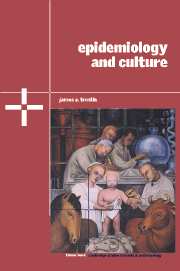Book contents
- Frontmatter
- Contents
- List of Figures and Tables
- Foreword by S. Leonard Syme
- Acknowledgments
- Epidemiology and Culture
- 1 Introduction
- 2 The Origins of an Integrated Approach in Anthropology and Epidemiology
- 3 Disease Patterns and Assumptions: Unpacking Variables
- 4 Cultural Issues in Measurement and Bias
- 5 Anthropological Contributions to the Study of Cholera
- 6 Anthropological and Epidemiological Collaboration to Help Communities Become Healthier
- 7 Perceiving and Representing Risk
- 8 Conclusion
- References
- Index
Foreword by S. Leonard Syme
Published online by Cambridge University Press: 05 June 2012
- Frontmatter
- Contents
- List of Figures and Tables
- Foreword by S. Leonard Syme
- Acknowledgments
- Epidemiology and Culture
- 1 Introduction
- 2 The Origins of an Integrated Approach in Anthropology and Epidemiology
- 3 Disease Patterns and Assumptions: Unpacking Variables
- 4 Cultural Issues in Measurement and Bias
- 5 Anthropological Contributions to the Study of Cholera
- 6 Anthropological and Epidemiological Collaboration to Help Communities Become Healthier
- 7 Perceiving and Representing Risk
- 8 Conclusion
- References
- Index
Summary
I have been waiting to read this book for 20 years. In 1983, I had a student in one of my classes at Berkeley, a young man named Jim Trostle, who challenged almost everything I said. Trostle was at the time a doctoral student in the Medical Anthropology program at Berkeley (a joint program with the Medical School in San Francisco), and he had taken off a year to get a Masters of Public Health degree. I was a Professor of Social Epidemiology in the School of Public Health, and my research and teaching involved the study of psychosocial factors as they influenced the causation of disease. Trostle argued that I was not paying enough attention to the concept of culture and that my research would suffer as a result. He said that epidemiologists and anthropologists had to find a way to work together so that both could be more effective contributors to human welfare.
I thought he might be right, but it was too difficult an idea to take seriously. Epidemiologists use quantitative methods in studies of large populations, whereas anthropologists do qualitative, ethnographic studies in remote Pacific islands. We read different books, we use a different language, and we have very different intellectual histories and traditions. Nevertheless, here was Trostle in my class, learning the new language and trying to find a way to bridge the gap between us. I didn't know if he could accomplish this difficult feat, but I was betting against it.
- Type
- Chapter
- Information
- Epidemiology and Culture , pp. xi - xivPublisher: Cambridge University PressPrint publication year: 2005



